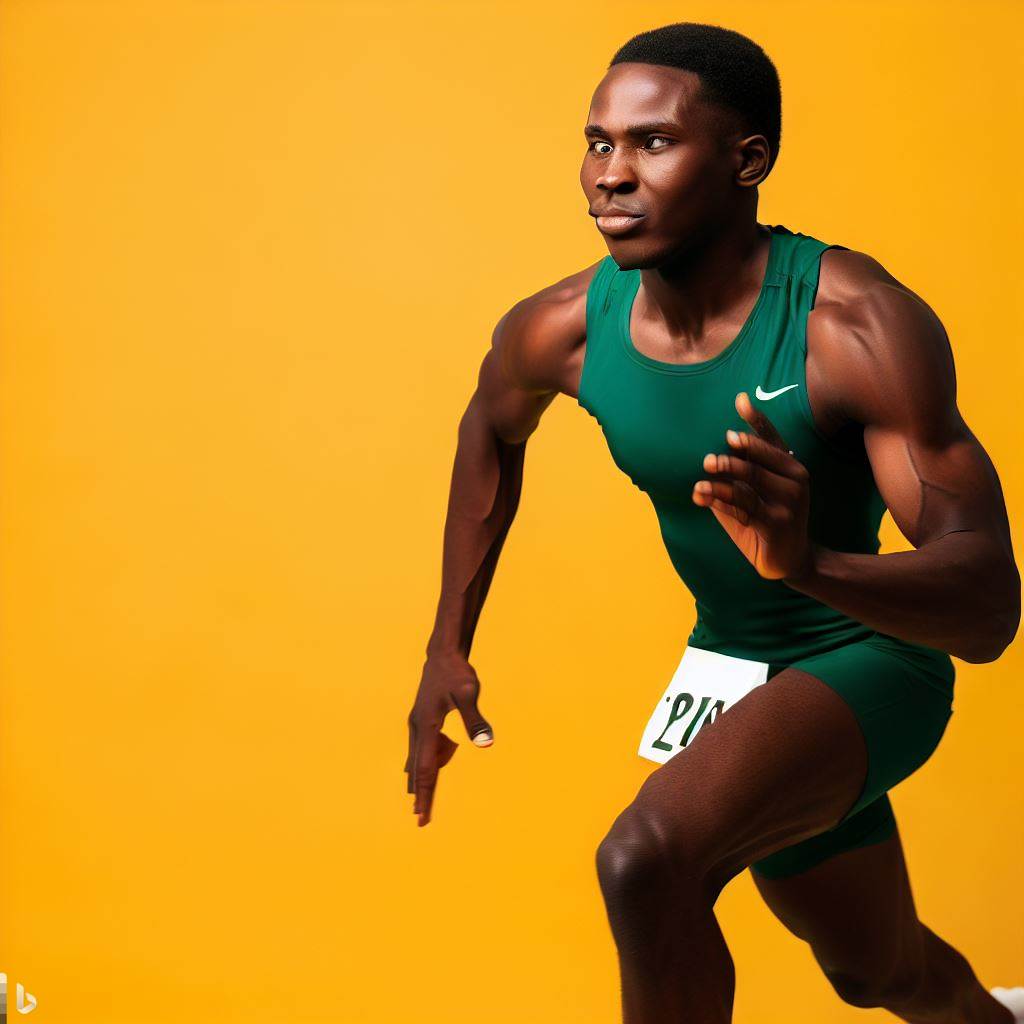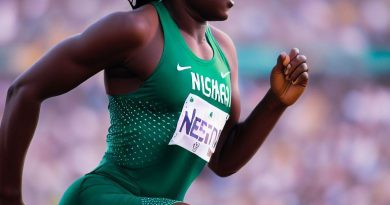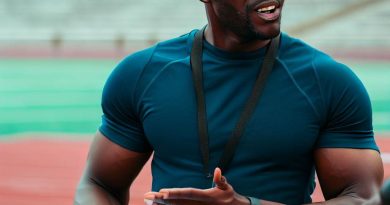How Nigeria’s Athletics Sector Influences Youth
Last Updated on July 27, 2023
Introduction
Nigeria’s athletics sector has been a significant influence on its youth for decades.
Athletics is a popular sport in the country and has produced many world-class athletes like Chioma Ajunwa, Blessing Okagbare, and Sunday Bada.
Nigeria’s history with athletics is rich, with the country participating in major international competitions like the Olympics, Commonwealth Games, and All Africa Games.
The sector has also been a source of national pride, with athletics being recognized as a means of promoting unity and success.
Young people in Nigeria have been inspired by the success of their athletes and have taken to the sport in droves.
With the sector receiving greater attention from the government and private sector, there is growing hope that athletics in Nigeria will continue to inspire and positively impact the country’s youth.
In this blog chapter, we will explore the relationship between Nigeria’s athletics sector and its youth and examine the various ways in which athletics has influenced the lives of young people in the country.
Read: Navigating the Nigerian Sports Industry: A Guide
Nigeria’s Athletics Sector
Nigeria’s athletics sector has come a long way, but still has a lot of work to do to reach its full potential.
From its early beginnings to the modern-day, the sector has seen notable athletes and significant achievements.
However, it has also faced numerous challenges and obstacles that have hindered its progress in recent years.
Current State of Nigeria’s Athletics Sector
Nigeria has a rich history of producing world-class athletes, including sprinters such as Chioma Ajunwa, Mary Onyali, and Blessing Okagbare, who have all made significant contributions to the global sports community.
Currently, one of Nigeria’s most promising athletes is Ese Brume, a long jumper who won a bronze medal at the 2019 World Championships in Doha.
Moreover, the country has produced numerous Olympic medalists, with its first medal coming from sprinter Modupe Oshikoya in the 4x100m relay event at the 1984 Los Angeles Olympics.
Other notable Olympic medalists include Chioma Ajunwa, who won Nigeria’s first Olympic gold in the long jump at the 1996 Atlanta Olympics, and Mary Onyali, who won a bronze medal at the 1992 Barcelona Olympics in the 4x100m relay.
The Development of Nigeria’s Athletics Sector
Nigeria’s athletics sector can be traced back to the early 1940s when the country was still a British colony.
The first-ever recorded athletics competition happened in Lagos in 1944. The sector started growing in the 1970s and 1980s, with the establishment of the Athletics Federation of Nigeria (AFN) in 1979.
This body created a more organized framework for athletics in the country, which led to significant improvements in athletes’ performances.
The growth of Nigeria’s athletics sector continued in the 1990s and early 2000s, with athletes achieving remarkable feats in various international competitions.
However, the sector began to experience a decline when funding became a significant challenge.
The country’s economic struggles also worsened the situation, resulting in fewer resources for training and organization of competitions.
Challenges and Obstacles Facing the Sector
Nigeria’s Athletics sector has faced numerous challenges and obstacles that have hindered its growth and development.
One of the significant challenges is the lack of adequate funding and investment in the sector.
The sector heavily relies on government funding, which is often inadequate and not efficiently utilized.
This has resulted in inadequate facilities and resources for athletes, which makes it difficult for them to compete at an international level.
Moreover, the sector has struggled with poor management, leading to corruption and mismanagement of funds.
This has hindered the efficient organization of athletics competitions and reduced opportunities for athletes to showcase their skills.
Accusations of doping among Nigerian athletes have also dented the sector’s reputation, leading to mistrust of athletes and the country as a whole.
Additionally, the country’s infrastructural challenges have also contributed to the struggles faced by the athletics sector.
Poor road networks, inadequate power supply, and other infrastructural challenges have made it difficult for athletes to train and attend competitions.
The lack of proper medical facilities has also been of concern, especially in cases of injuries sustained during competition or training.
The Way Forward for Nigeria’s Athletics Sector
Despite the challenges and obstacles facing Nigeria’s Athletics sector, there is still hope for growth and development.
The private sector can increase investment in the sector to provide the needed resources and facilities for athletes.
Also, there needs to be a better management structure that ensures transparency and accountability in the sector.
The government can also increase funding for the sector, but more importantly, such funding should be utilized effectively to achieve the desired objectives.
An overhaul of the sector’s management and governance structure can also lead to the efficient organization of competitions, which provides opportunities for athletes to showcase their talents.
Besides, the sector should prioritize the development of sporting facilities, such as world-class training facilities, stadia, and other relevant infrastructure.
The provision of these facilities would encourage athletes to train and compete better.
Lastly, the implementation of a robust anti-doping system will help restore trust in Nigerian athletes and the sector.
Nigeria’s athletics sector has contributed significantly to the country’s global sports profile.
However, its full potential is yet to be achieved due to numerous challenges and obstacles.
With concerted efforts from the government, private sector, and other relevant stakeholders, the sector can undergo significant growth and development.
This growth can lead to Nigeria producing more world-class athletes, further enhancing the country’s image on the global sports stage.
Read: Future Prospects for Nigeria’s Athletics Industry
Influence on Youth
The athletics sector in Nigeria has a significant influence on the youth in the country.
Nigeria has a long-standing history of producing successful athletes who serve as role models for the budding youths.
Athletics has a far-reaching impact on the development and well-being of young people and is regarded as a critical factor in shaping the lives of the younger generation.
Role Models
Successful Nigerian athletes serve as excellent role models for the youths aspiring to be in the field of athletics.
These athletes have inspired a new generation of Nigerian youths and have given them something to aspire to. Young people look up to these athletes and try to emulate them in every possible way.
They follow their training, their discipline, and their focus, and strive hard to be like them.
The Nigerian athletes have not only achieved tremendous success at the national level but have also made a name for themselves on the global stage.
Their hard work, perseverance, and dedication have set an excellent example for the youths of the country.
Impact on Youth Development and Well-being
The athletics sector has a significant impact on the development and well-being of young people.
The various programs and initiatives aimed at developing athletics in the country have helped in nurturing young talent and fostering a culture of sportsmanship.
Athletics promotes physical fitness, mental well-being, and overall health, which is essential for leading a long and healthy life.
The sport also plays a crucial role in fostering teamwork, developing leadership qualities, and instilling discipline in young people.
Athletics is also a great way to keep young people occupied and away from the negative influences that might lead them down the wrong path.
The impact of athletics on the youth development and well-being is immense and plays a significant role in shaping the lives of the young people in the country.
Challenges and the Way Forward
Despite the numerous benefits of athletics, there are several challenges facing the sector in Nigeria.
The lack of proper infrastructure, inadequate funding, and poor management have hindered the development of athletics in the country.
The lack of facilities and equipment is a significant hindrance in the growth of the sport.
The government and other stakeholders must take concrete steps to address these challenges and provide the necessary support for the growth of athletics in the country.
The promotion of local talent, the development of world-class facilities, and proper funding and management can go a long way in propelling athletics to new heights in Nigeria.
The way forward for the athletics sector in Nigeria must be a concerted effort from all stakeholders to provide the necessary support and infrastructure for the growth of the sport.
In essence, the athletics sector in Nigeria has a significant influence on the youth in the country.
The success of Nigerian athletes has inspired a new generation of young people to take up the sport and strive for excellence.
Athletics plays a critical role in the development and well-being of young people and helps in shaping their lives.
Despite the challenges facing the sector, the future of athletics in Nigeria looks bright, and with the right support and infrastructure, the sport can achieve new heights, and young talents can flourish.
The athletics sector has the potential to create success stories and become a source of pride and inspiration for the country.
Read: Exploring Nigeria’s Sports Talent Development Programs
Success Stories
Athletics is a sector that has inspired young people in Nigeria to achieve personal success and social mobility. Here are some success stories that demonstrate the potential of athletics as a tool for success.
- Blessing Okagbare-Ighoteguonor is a Nigerian track and field athlete who won a silver medal in the long jump at the 2008 Beijing Olympics.
- Divine Oduduru is a sprinter who won a gold medal in the 2019 African Games and set a new national record in the 100m sprint.
- Ese Brume is a long jumper who won a bronze medal at the 2019 World Championships.
These young athletes are a testament to the fact that athletics can be a vehicle for personal success.
It is also a tool for social mobility, as many of these athletes come from humble backgrounds but were able to achieve success through their sport.
In Nigeria, athletics is an important avenue for young people to make a name for themselves and pursue their dreams.
However, there is still potential for many more success stories in the future
- With the proper investment and development, athletes like Okagbare-Ighoteguonor, Oduduru, and Brume can inspire a new generation of young people to pursue a career in athletics.
- In turn, this could lead to increased recognition and success for Nigeria on the international stage.
- However, it is important to note that success in athletics is not just about individual achievements. It is about creating a sustainable and supportive environment that fosters growth and development for all athletes.
The Nigerian government and organizations have an important role to play in fostering this environment.
Investing in training facilities, coaching programs, and grassroots initiatives can create opportunities for more young people to get involved in athletics and pursue success.
Athletics has the power to inspire young people and provide a path to success that may otherwise be unavailable to them.
As Nigeria continues to invest in the sector, we can look forward to even more success stories in the future.

The Way Forward
- Establish more training centers across the country to cater to young athletes in different regions.
- Provide better equipment and facilities to improve training conditions for athletes.
- Encourage private sector investment in athletics to increase funding and support for the sector.
- Collaborate with international organizations to enhance capacity building and exposure for athletes.
- Develop a talent identification program to discover and nurture young talents.
- Improve coaching standards by organizing training and development programs for coaches.
- Introduce athletics as a subject in secondary schools to create awareness and encourage participation among the youth.
- Create sports clubs in schools to facilitate the development of athletics talents.
- Establish a functional administrative structure within the athletics sector to enhance coordination and effectiveness.
The Nigerian government and entities should recognize the importance of investing in athletics for sector improvement.
Funding and support can be provided through scholarships, grants, and subsidies for significant growth. A strong athletics sector benefits the youth and the country by promoting national unity and pride.
It also contributes to the economy through sectors like hospitality, tourism, and entertainment.
A conducive environment through investment and support helps young athletes compete internationally, inspiring others to join.
The athletics sector can positively influence the youth with efforts from stakeholders, including the government and private sector.
Implementing these measures can empower the youth and develop Nigeria’s athletics sector significantly.
Read: The Rise of Nigerian Athletes on the Global Stage
Conclusion
In summary, Nigeria’s athletics sector has immense influence on the youth population. The sector provides an avenue for young people to develop their talents, showcase their potential, and pave a career path in the sports industry.
Moreover, athletics gives hope to many young Nigerians, especially those from disadvantaged backgrounds who face limited opportunities.
With more investment and development, the sector has the potential to uplift millions of young people and drive positive social change.
Going forward, it is crucial that the government, private sector, and other stakeholders prioritize the growth of Nigeria’s athletics sector.
This will require increased funding, better infrastructure, and more support for young athletes.
With the right approach, the athletics sector can contribute significantly to the nation’s economic growth, social development, and global reputation.


